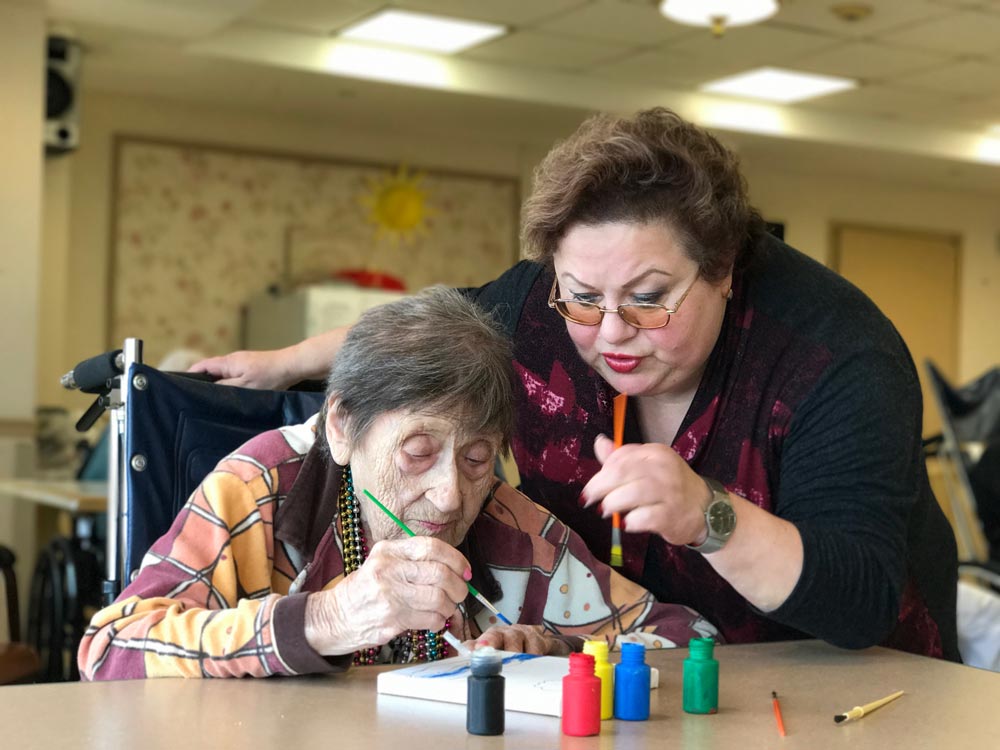Phenomenal Memory Care Charlotte: Methods for Engaging and Sustaining Residents
Wiki Article
How to Provide Significant and Individualized Mental deterioration Treatment
The provision of meaningful and tailored mental deterioration care calls for a nuanced understanding of each person's special history and choices. Care methods need to be tailored to involve the person in ways that reverberate with their past experiences, therefore cultivating emotional links and enhancing total wellness.Recognizing Mental Deterioration Originality

Care providers need to evaluate cognitive capabilities, emotions, and behavior patterns to develop personalized treatment strategies. This might consist of adjusting communication designs, utilizing familiar regimens, and utilizing significant activities that reverberate with the person's previous experiences. As an example, involving an individual with an enthusiasm for music via musical activities might evoke positive memories and improve psychological wellness.
Moreover, understanding individuality fosters a caring technique that appreciates the self-respect and freedom of those living with mental deterioration. It motivates caretakers to listen proactively, observe behavioral signs, and continue to be versatile in their caregiving strategies (memory care facilities charlotte). By focusing on uniqueness, caretakers can not just enhance the lifestyle for those with mental deterioration but likewise build a more profound understanding of their unique point of views, ultimately bring about more compassionate and efficient care
Building Depend On and Rapport
Developing count on and relationship is fundamental in dementia care, as it produces a secure and encouraging environment for people impacted by the problem. Building these connections requires consistent, caring interactions that focus on the needs and sensations of the person. Caregivers should come close to interactions with compassion, identifying the special challenges dealt with by those with dementia, consisting of memory loss, confusion, and emotional distress.Caretakers ought to use clear, basic language and non-verbal hints to communicate understanding and support. Energetic paying attention demonstrates regard and recognition, enabling individuals to express themselves without concern of judgment.
Familiarity with day-to-day tasks and caregivers promotes a sense of stability, allowing individuals to feel even more at simplicity. By doing so, caretakers strengthen the individual's identification, advertising self-respect and regard, inevitably leading to stronger, extra significant connections in the context of mental deterioration care.
Tailoring Activities and Engagement
Involving individuals with mental deterioration with tailored tasks can considerably enhance their lifestyle and foster a deeper connection between caregivers and those in their care. Customization is essential, as it recognizes the one-of-a-kind backgrounds, interests, and abilities of each person. Tasks should be developed to promote cognitive functions, promote physical movement, and motivate social communication, all while remaining pleasurable and fulfilling.To tailor tasks properly, it is vital to assess the person's choices and cognitive capacities. Some may discover delight in horticulture, while others may appreciate music or art. Simple, acquainted jobs can stimulate positive memories and supply a feeling of accomplishment. Additionally, incorporating elements of regimen can use comfort and stability, allowing people to involve with activities much more confidently.
Caregivers can improve engagement by participating together with the people, cultivating an interactive and supportive environment. It is also essential to continue to be adaptive and flexible, adjusting tasks as needed based on the person's energy degrees and mood. Inevitably, purposeful engagement through tailored tasks not only uplifts individuals with mental deterioration however also improves the caretaker connection, promoting mutual enjoyment and understanding.
Reliable Interaction Strategies
Effective communication is vital in dementia treatment, as it promotes a feeling of connection and understanding between caregivers and individuals experiencing cognitive decline. Employing efficient interaction techniques can significantly enhance the top quality of communications and lower aggravation for both events.To start with, using basic, clear language is vital. Familiar words and short sentences assist people comprehend and react better. Furthermore, maintaining a calmness and favorable tone can develop a comforting setting, which is vital for people that might really feel nervous or overwhelmed.
Non-verbal interaction plays a significant role. Caretakers need to focus on body language, facial expressions, and motions, as these signs can commonly convey greater than words - charlotte care home. Developing eye contact and using gentle touch can likewise strengthen connections and communicate empathy
Energetic listening is an additional essential part. Caregivers need to be mindful, enabling individuals to express themselves totally, also if their speech is unclear or fragmented. This lionizes and urges extra open communication.
Finally, validating sensations and experiences is crucial. Acknowledging feelings, no matter of their basis in truth, can offer convenience and enhance the caregiver-individual partnership, promoting a much more supportive ambience.
Supporting Family Participation
Household involvement plays a substantial duty in the total care and support of individuals with dementia. Engaging relative creates a collective environment that enhances the quality of treatment, fosters psychological connections, and guarantees that the special demands of the person are satisfied. Member of the family typically possess very useful insights right into the person's history, preferences, and behaviors, which can be critical in creating customized treatment approaches.
In addition, family members can be encouraged to take part in daily care activities, such as involving in purposeful conversations or aiding with acquainted routines. This not just assists receive the individual's feeling of identification however also enhances familial bonds. Eventually, by promoting an inclusive approach that values family members payments, care suppliers can enhance the total experience for both individuals with mental deterioration and their loved ones.
Final Thought
Finally, providing individualized and meaningful dementia treatment demands a detailed understanding of dementia care charlotte each individual's one-of-a-kind background and choices. Developing count on and rapport via caring interactions is important for developing a risk-free setting. Customizing activities to resonate with personal rate of interests enhances emotional well-being and advertises self-respect. Effective communication techniques further sustain this procedure, while proactively involving relative improves the caregiving experience and fosters much deeper connections. Collectively, these techniques contribute to improved quality of life for individuals with mental deterioration.
The arrangement of individualized and meaningful mental deterioration care calls for a nuanced understanding of each person's one-of-a-kind background and preferences. By doing so, caretakers reinforce the individual's identity, advertising dignity and respect, inevitably leading to stronger, more purposeful connections in the context of mental deterioration treatment.
Engaging individuals with mental deterioration via tailored activities can significantly enhance their high quality of life and promote a deeper connection between caretakers and those in their treatment.Household participation plays a substantial role in the total care and assistance of people with mental deterioration. Eventually, by fostering an inclusive method that values family members payments, care carriers can boost the overall experience for both individuals with mental deterioration and their liked ones.
Report this wiki page